Piquing China just days before meetings with its leaders, US President George W. Bush yesterday held up Taiwan as a model of freedom "at all levels" that the communist giant should emulate.
Bush's speech opening a four-country tour of Asia amounted to a road map of the coming discussions he was to have on a potential bird-flu outbreak, global trade, North Korea's nuclear ambitions and other issues at a gathering of Pacific Rim economies in South Korea.
Bush arrived in Busan, South Korea, last night for the APEC summit and a one-on-one meeting with South Korean President Roh Moo-hyun. The US president met with his closest Asian ally, Japanese Prime Minister Junichiro Koizumi, in Kyoto, Japan, earlier yesterday and was traveling to China and Mongolia over the weekend.

PHOTO: AFP
In remarks sure to irritate his Chinese hosts, Bush prodded the communist nation to grant basic freedoms to its 1.3 billion people and further open its economy.
"We encourage China to continue down the road of reform and openness," Bush told an audience that stayed silent until its polite applause at the end. "By meeting the legitimate demands of its citizens for freedom and openness, China's leaders can help their country grow into a modern, prosperous and confident nation."
His challenge to Beijing immediately followed lavish praise of Taiwan.
"By embracing freedom at all levels, Taiwan has delivered prosperity to its people and created a free and democratic Chinese society," Bush said. Pointing to Taiwan -- as well as South Korea -- Bush said political freedoms are the inevitable product of the kind of economic liberalization China has begun pursuing.
"Men and women who are allowed to control their own wealth will eventually insist on controlling their own lives and their own future. As China reforms its economy, its leaders are finding that once the door to freedom is opened even a crack, it cannot be closed," he said.
Comparing Taiwan and China, even indirectly, raises a major thorn in US-China relations. While US policy recognizes only one China -- including Taiwan -- and opposes Taiwanese independence, Washington is also Taiwan's largest arms benefactor and is bound by the Taiwan Relations Act to help Taiwan defend itself if attacked.
Bush's speech was an attempt to follow through on his inaugural promise to predicate US relations with all nations on their treatment of their citizens -- a pledge that meets its most difficult test with strategic allies such as China, Saudi Arabia and Pakistan.
Still, the call for change in China was not as tough as some on Capitol Hill and among his conservative supporters might want, as it was accompanied by praise on several fronts.
Bush recognized that economic reforms have resulted in a better-housed, better-fed populace, and he lauded China's leadership in the effort to rid North Korea of its nuclear weapons programs.
But while the US president said China should allow people to worship without state control -- a point he hoped to underscore by visiting an officially recognized church while in Beijing -- Bush did not mention China's human rights record.
"The Chinese are not going to like being scolded," said Adam Segal, who studies China at the Council on Foreign Relations in New York. "But if they are of the mind to, they can read it with a positive spin."
Beijing's response was muted.
"Our common points outnumber our differences," Chinese Foreign Minister Li Zhaoxing (
also see stories:
US releases sickening testimony from North Korea
Rice calls for North Koreans to `get serious' at talks
Ho meets with her APEC counterparts in S Korea
South Korea foresees the tech future at APEC summit

GET TO SAFETY: Authorities were scrambling to evacuate nearly 700 people in Hualien County to prepare for overflow from a natural dam formed by a previous typhoon Typhoon Podul yesterday intensified and accelerated as it neared Taiwan, with the impact expected to be felt overnight, the Central Weather Administration (CWA) said, while the Directorate-General of Personnel Administration announced that schools and government offices in most areas of southern and eastern Taiwan would be closed today. The affected regions are Tainan, Kaohsiung and Chiayi City, and Yunlin, Chiayi, Pingtung, Hualien and Taitung counties, as well as the outlying Penghu County. As of 10pm last night, the storm was about 370km east-southeast of Taitung County, moving west-northwest at 27kph, CWA data showed. With a radius of 120km, Podul is carrying maximum sustained

Tropical Storm Podul strengthened into a typhoon at 8pm yesterday, the Central Weather Administration (CWA) said, with a sea warning to be issued late last night or early this morning. As of 8pm, the typhoon was 1,020km east of Oluanpi (鵝鑾鼻), Taiwan’s southernmost tip, moving west at 23kph. The storm carried maximum sustained winds of 119kph and gusts reaching 155kph, the CWA said. Based on the tropical storm’s trajectory, a land warning could be issued any time from midday today, it added. CWA forecaster Chang Chun-yao (張竣堯) said Podul is a fast-moving storm that is forecast to bring its heaviest rainfall and strongest

TRAJECTORY: The severe tropical storm is predicted to be closest to Taiwan on Wednesday and Thursday, and would influence the nation to varying degrees, a forecaster said The Central Weather Administration (CWA) yesterday said it would likely issue a sea warning for Tropical Storm Podul tomorrow morning and a land warning that evening at the earliest. CWA forecaster Lin Ting-yi (林定宜) said the severe tropical storm is predicted to be closest to Taiwan on Wednesday and Thursday. As of 2pm yesterday, the storm was moving west at 21kph and packing sustained winds of 108kph and gusts of up to 136.8kph, the CWA said. Lin said that the tropical storm was about 1,710km east of Oluanpi (鵝鑾鼻), Taiwan’s southernmost tip, with two possible trajectories over the next one

TALKS CONTINUE: Although an agreement has not been reached with Washington, lowering the tariff from 32 percent to 20 percent is still progress, the vice premier said Taiwan would strive for a better US tariff rate in negotiations, with the goal being not just lowering the current 20-percent tariff rate, but also securing an exemption from tariff stacking, Vice Premier Cheng Li-chiun (鄭麗君) said yesterday. Cheng made the remarks at a news conference at the Executive Yuan explaining the new US tariffs and the government’s plans for supporting affected industries. US President Donald Trump on July 31 announced a new tariff rate of 20 percent on Taiwan’s exports to the US starting on Thursday last week, and the Office of Trade Negotiations on Friday confirmed that it